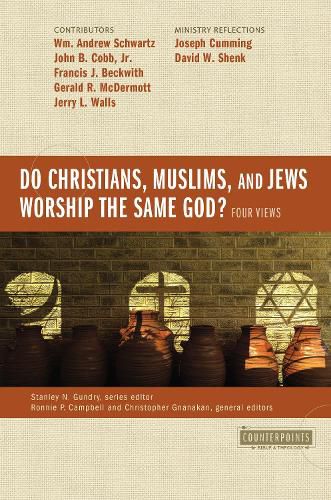Readings Newsletter
Become a Readings Member to make your shopping experience even easier.
Sign in or sign up for free!
You’re not far away from qualifying for FREE standard shipping within Australia
You’ve qualified for FREE standard shipping within Australia
The cart is loading…






During a time of global conflict, the theological question of whether Muslims, Jews, and Christians worship the same God carries political baggage. Is the God of ISIS the same as the God of Israel Do Sunni Muslims and Protestant Christians pray to the same Creator and Sustainer of the universe
In this Counterpoints volume, five leading scholars present the main religious perspectives on this question, demonstrating how to think carefully about an issue where opinions differ and confusion abounds.
All Worship the Same God: Religious Pluralist View (Wm. Andrew Schwartz and John B. Cobb, Jr.) All Worship the Same God: Referring to the Same God View (Francis J. Beckwith) Jews and Christians Worship the Same God: Shared Revelation View (Gerald R. McDermott) None Worship the Same God: Different Conceptions View (Jerry L. Walls)
Contributors examine related subtopics such as:
The difference between God being referentially the same and essentially the same What the same means when referring to God The significance of the Trinity in this discussion Whether religious inclusivism is inferred by certain understandings of God’s sameness The appropriateness of interfaith worship.
Additional essays by Joseph Cumming and David W. Shenk explore the implications of this question specifically for Christians wanting to minister among, and build relationships with, Muslims. Insightful, gracious, and relevant, Do Christians, Muslims, and Jews Worship the Same God sheds light on one of the most important theological issues of our day.
The Counterpoints series presents a comparison and critique of scholarly views on topics important to Christians that are both fair-minded and respectful of the biblical text. Each volume is a one-stop reference that allows readers to evaluate the different positions on a specific issue and form their own, educated opinion.
$9.00 standard shipping within Australia
FREE standard shipping within Australia for orders over $100.00
Express & International shipping calculated at checkout
During a time of global conflict, the theological question of whether Muslims, Jews, and Christians worship the same God carries political baggage. Is the God of ISIS the same as the God of Israel Do Sunni Muslims and Protestant Christians pray to the same Creator and Sustainer of the universe
In this Counterpoints volume, five leading scholars present the main religious perspectives on this question, demonstrating how to think carefully about an issue where opinions differ and confusion abounds.
All Worship the Same God: Religious Pluralist View (Wm. Andrew Schwartz and John B. Cobb, Jr.) All Worship the Same God: Referring to the Same God View (Francis J. Beckwith) Jews and Christians Worship the Same God: Shared Revelation View (Gerald R. McDermott) None Worship the Same God: Different Conceptions View (Jerry L. Walls)
Contributors examine related subtopics such as:
The difference between God being referentially the same and essentially the same What the same means when referring to God The significance of the Trinity in this discussion Whether religious inclusivism is inferred by certain understandings of God’s sameness The appropriateness of interfaith worship.
Additional essays by Joseph Cumming and David W. Shenk explore the implications of this question specifically for Christians wanting to minister among, and build relationships with, Muslims. Insightful, gracious, and relevant, Do Christians, Muslims, and Jews Worship the Same God sheds light on one of the most important theological issues of our day.
The Counterpoints series presents a comparison and critique of scholarly views on topics important to Christians that are both fair-minded and respectful of the biblical text. Each volume is a one-stop reference that allows readers to evaluate the different positions on a specific issue and form their own, educated opinion.